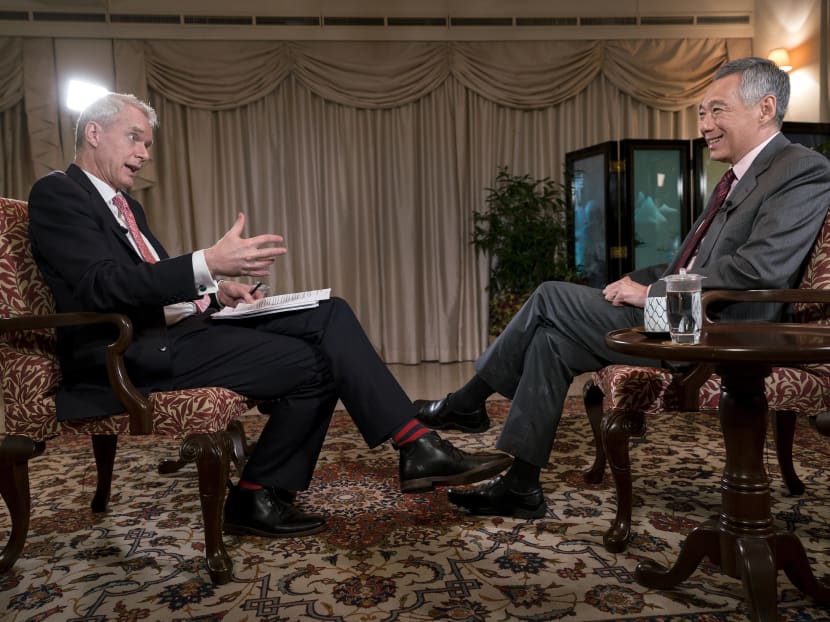One-party rule doesn’t mean Singapore is closed: PM Lee
SINGAPORE — Prime Minister Lee Hsien Loong has rejected an assertion by a BBC journalist that Singapore is not a successful democracy because it has been governed by the same party since independence and lacks a powerful Opposition.

BBC HARDTalk presenter Mr Stephen Sackur (left) and PM Lee Hsien Loong. Photo: Ministry of Communications and Information
SINGAPORE — Prime Minister Lee Hsien Loong has rejected an assertion by a BBC journalist that Singapore is not a successful democracy because it has been governed by the same party since independence and lacks a powerful Opposition.
“Just because the voters have voted for me and my party does not mean that we are not open,” Mr Lee said on the BBC Hardtalk programme that aired on Wednesday (March 1), where he was interviewed by Mr Stephen Sackur.
“The politics is open. There is no constraint on people forming political parties, standing for election, campaigning, publishing manifestos,” Mr Lee added.
To Mr Sackur’s point that there are only a handful of Opposition Members of Parliament (MPs), Mr Lee pointed out that there are six elected and three unelected MPs who are not from the ruling People’s Action Party, and said the number would be increased to at least 12.
“But, really, it is the workings of our democratic system,” he said. “Once the Government stops functioning, or for that matter, if I have a Member of Parliament who does not perform his duties and loses the confidence of the supporters and I field him again, the situation will change overnight.”
Asked to comment on claims by human rights groups that he is imposing “a mix of absolute political control and repression of dissenting voices that was the hallmark of his father”, Mr Lee replied: “If it were such a miserable place, you would not be interviewing me. You would be going down the streets and getting ‘vox pops’, and all sorts of people would be saying terrible things about the Government and some of them would have emigrated.
“But the fact is, Singaporeans are happy, they have chosen this Government. We are governing the country and the people to the best of our ability. Millions more would like to come if we allowed it.”
During the interview, Mr Sackur also brought up the linking of trade deals with human rights, an issue recently debated in British Parliament. He cited how the leader of the Liberal Democrats in the UK, Mr Tim Farron, had argued that Britain should raise issues of freedom of expression and freedom of the press in any trade talks with Singapore. “I do not see you being restrained in asking me questions,” Mr Lee said in response.
“I would not presume to tell you how your Press Council should operate. Why should you presume to tell me how my country should run?” he added, noting that Singapore has one of the fastest Internet accesses in the world and no “great wall” of the Internet.
Pressed on how he would react if Britain were to require that trade deals come with guarantees on human rights and press freedom, Mr Lee laughed and replied: “I would wait to react until I see it.”
But he made clear that he thought the notion impractical, adding that while America promotes moral causes, it does not apply it universally across the world. “Yes, they do it when the cost is low. But you look at some of the most important oil producers in the world. Do they conform? Have they been pressured? You have to do business.”
Mr Lee added that, in this diverse world, no one has a monopoly of virtue or wisdom. “Unless we can accept that and we prosper together, and cooperate together, accepting our differences — differences in values, differences in outlook, differences even in what we see the goals of life to be — it becomes difficult.”









